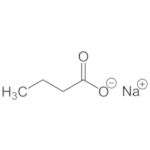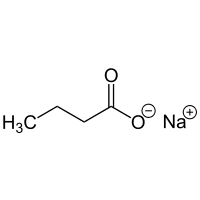Sodium butyrate is a short chain fatty acid by-product of gut microbes and the primary energy source for cells lining the colon. Since it is sold as a dietary supplement in the United States, it is not regulated by the FDA as a medication. Sodium butyrate may be a beneficial supplement for those suffering from mild-to-moderate Crohn’s disease, especially since it seems generally safe and has few potential side effects. 
Crohn’s disease is an autoimmune inflammatory bowel disease whose underlying cause is not yet known. Various etiologies have been proposed, ranging from immune responses to pathogenic parasites or bacteria, to the effects of certain foods, to imbalances in the normal intestinal flora. Unlike the other main form of inflammatory bowel disease, Crohn’s disease can affect any part of the gastrointestinal system, from the mouth to the anus. Symptoms can include abdominal pain, fevers, diarrhea, and rectal bleeding. Over time complications can include scarring and strictures, nutritional deficiencies, abscesses, fistulas and bowel obstructions.
A study. Di Sabatino, et al (2005) investigated the effect of sodium butyrate supplementation on a group of Crohn’s patients. The group was given enteric-coated sodium butyrate supplements for 8 weeks. An impressive 69% responded to treatment, with the majority of those people achieving full remission. Those who had a clinical response also had decreased mucosal levels of inflammatory markers NF-κB and IL-1β after treatment.1
It appears that sodium butyrate may exert its positive effects by down-regulating inflammatory cytokines, thereby decreasing mucosal inflammation that is a core mechanism of Crohn's disease. Because it is an energy source to colonocytes, it is also thought to aid in the healing of the lining of the colon after injury.
Due to the lack of large controlled studies, sodium butyrate is not yet being used as a conventional treatment for IBD. But data from small studies appears promising. We have successfully added it to the regimens of some of our patients with Crohn's, and early “N of 1” experiments appear promising.
Medically-supervised Quant Coaching. Since people often respond differently to medications and supplements, we have found it very beneficial at My Doctor Medical Group to help our patients with Crohn's conduct carefully controlled experiments of dietary, supplement and medication interventions by using self-tracking technology. These experiments are usually conducted under the supervision of a Quant Coach (me) and licensed health professionals like our medical director Paul Abramson MD, and a registered dietitian like Denise Garbinski RD.
Please contact us if you would like more information on the ways we help patients with inflammatory bowel disease in our practice in San Francisco. And please talk to your treating physician before adding any dietary supplements to your regimen.
1Di Sabatino et al., Alimentary Pharmacology & Therapeutics, Volume 22, Issue 9, pages 789–794, November 2005









Comments 3
Pingback: New drug for IBS!
I have crohns and was very interested in ur article I believe I will try this product
Hola es un gusto escribirles, super interesante lo que acabo de leer sobre el butirato sódico, que referencias tienen de su uso en pacientes con Enfermedad Celiaca , gracias .